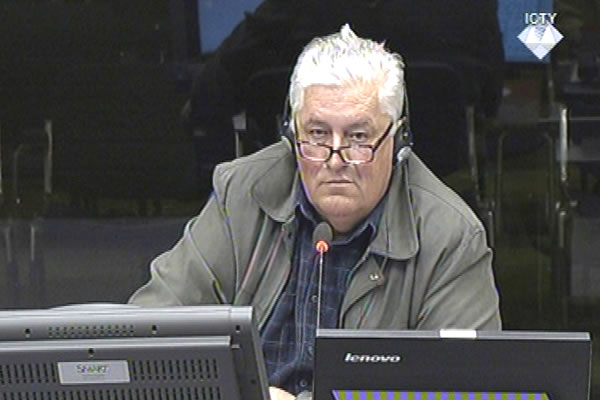Home
WITNESS KNOWS NOTHING ABOUT UNIDENTIFIED INCIDENTS
In his statement to the defense, Bosnian Serb military officer Branko Volas said he knew nothing about the incidents listed in the indictment against Ratko Mladic. Volas could not even say what incidents he meant
 Branko Volas, defence witness at Rako Mladic trial
Branko Volas, defence witness at Rako Mladic trial In the indictment against Ratko Mladic, Kljuc is listed among the six BH municipalities where the campaign of persecution against the non-Serbs had reached the scale of genocide. Defense witness Branko Volas argued that Muslims and Croats had voluntarily left the municipality of Kljuc. The witness had no knowledge of any crimes against non-Serb civilians, including several mass murders listed in the indictment.
In early 1992, the witness was drafted into the JNA. In June 1992, the witness was appointed assistant for intelligence and security to the commander of the 3rd Battalion in the 17th Kljuc Brigade. Later, during the summer of 1995, the witness was appointed the battalion commander. Volas blamed Muslim extremists for starting the conflict in Kljuc. In May 1992, as the witness explained, the extremists ambushed a JNA bus convoy and a MUP patrol. Dusan Stojkovic, deputy commander of the Kljuc police station, was killed in the incident. The witness admitted that he had heard about those incidents from others and that he had no first-hand knowledge.
Volas’s written statement was admitted into evidence. In Paragraph 14 of his statement, the witness states, ‘At the time when the incidents listed in the indictment occurred, I was in the Kupres battlefield. I don’t know anything about the number of victims and the event itself’. Presiding judge Orie wanted to know what specific event the witness didn’t know anything about. Volas replied that he couldn’t remember exactly what that part of the statement referred to. ‘So you said that you don’t know anything about something you are not able to identify’, the presiding judge noted. Volas said that he only heard rumors about the crimes in Kljuc. He didn’t’ know if those rumors were true or not.
At the beginning of the cross-examination, prosecutor Jeremy noted that in early June 1992, when at least 77 Muslim prisoners were killed in a school in Velagici, the witness was indeed in the battlefield in Kupres. However, at the time of the second mass murder, the witness was in Kljuc. Volas returned from the frontline in late June 1992, and about 144 Muslim civilians were massacred in the village of Biljani on 10 July 1992. The witness said that in the relevant period he was with his battalion command in the village of Donja Previja. The village is located some 12 to 13 km from Kljuc, at the opposite end of the municipality.
In his statement to the defense, the witness recounted that the conditions in Kljuc during the war were difficult for everyone. As a consequence, people from all ethnic communities ‘voluntarily’ left the area; the witness could understand their motives. In a report to Ratko Mladic in November 1992, Vinko Kondic, the Kljuc police chief, said that only 2,000 Muslims remained in the municipality. Before the war there were 17,500 Muslims there. The witness did realize that Muslims were leaving in ever greater numbers, but he insisted they left the municipality voluntarily to go to ‘third countries’.
The prosecutor showed the witness a conclusion of the local War Presidency of 30 July 1992. According to the document, ‘the residents are allowed to move out permanently only if they exchange their real estate with another party’. If not, the real estate would be confiscated by the Serb municipality of Kljuc. The prosecutor suggested that it was in fact a guarantee that the non-Serb population would not return. It also shows that the non-Serbs did not leave voluntarily. Apart from remarking that the measures looked ‘funny’ to him, Volas refrained from further comments. As he said, he didn’t know much about ‘legal principles’.
Linked Reports
- Case : Mladic
- 2015-03-04 WHAT IS AND WHAT ISN’T CREDIBLE?
- 2015-03-03 EXCHANGES WERE PART OF ETHNIC CLEANSING MACHINERY
- 2015-03-02 WITNESS: THERE WERE CRIMES, BUT I CAN'T SAY WHICH ONES
- 2015-03-09 PREPARATIONS IN TRNOPOLJE FOR ‘PROPAGANDA VISIT’
- 2015-03-09 VOLUNTARY SURRENDER AND KILLING AROUND SREBRENICA
- 2015-03-10 THE HYATT HOTEL IN TRNOPOLJE
